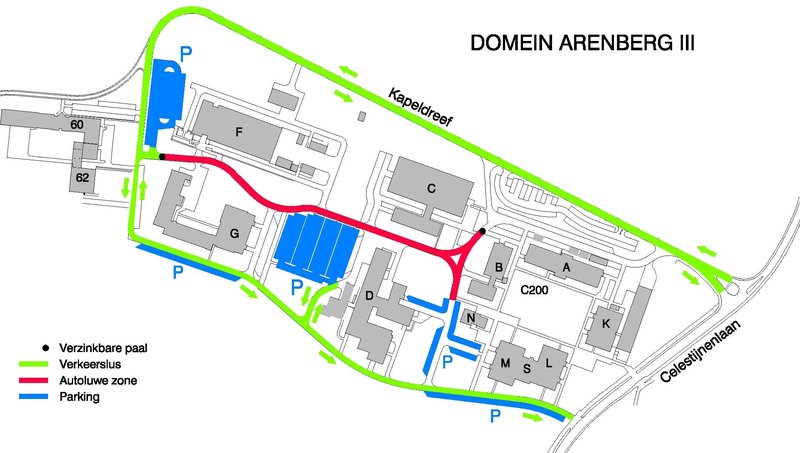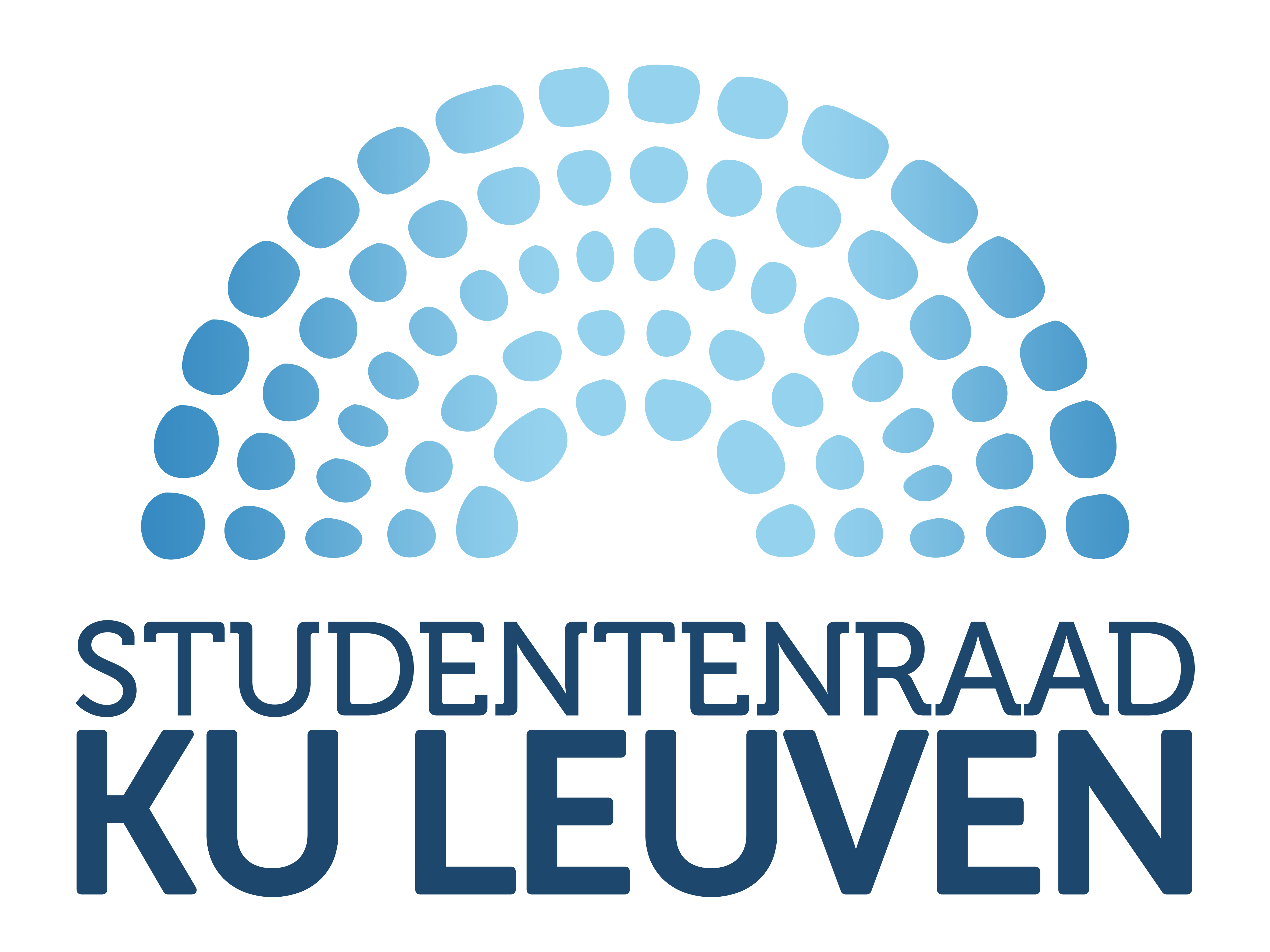For freshmen
As a freshman at the university a lot of information comes to you in the first weeks. Some information you forget and sometimes it can be a lot, but don't worry! This page is just to make sure that you are know everything you need to know and repeats the most important concepts needed to successfully complete your career at KU Leuven. Also for some senior students this page may contain useful information, if you may have forgotten something.
What should I do before the start of the academic year?
Before the start of the academic year, you obviously need to register for a program. It is possible to enroll after the start of the academic year, if you still have doubts about your choice of study, but that is strongly discouraged and you do not have the right to go to all classes and the like. Nor will you be able to access the online platform called Toledo. Next to your enrollment, however, you don't have to do much. The only thing you need to do before the start is to look for a student house if you need it and follow any instructions that are clearly given by email or at the registration. You don't have to buy any books yet and you don't have to check which courses to take. What you can do, however, is see if the student association you represent organizes an introductory weekend. This is a weekend before the start of the academic year where you can get to know your peers. For the different bachelors, the following student associations are involved:
- Bachelor of Mathematics, Physics, Computer Science or TWIN: Wina
- Bachelor of Chemistry or Biochemistry and Biotechnology: Chemistry
- Bachelor of Biology: Bios [Dutch only]
- Bachelor of Geology: Geos
- Bachelor Geography: Merkator [Dutch only]
- KULAK: Presidium Hyperion (for academic year 20-21) [Dutch only]
In addition, you only have one thing left: showing up on your first day, the so-called Starter Days. Here you will get all the information you need to start your life as a student.
What should I remember about the first weeks?
In those first weeks you will get a lot of information about where you need to be, how university life works, what tasks and tests await you during the first semester and so on. What follows is a list of the most important practical things to remember in the coming years. These are mainly a number of concepts that are useful. The most important advice we can give here is very simple: if you don't remember something, ask a senior year, a student representative or a student counselor.
ISP/IER
The ISP, or individual study program, is an application that can be found under KU Loket in Toledo. In the ISP you fill in the courses you will be taking this year. If you do not indicate a course in this application it means that you will not take it. The deadline for filling in your ISP is the third Wednesday of the semester. In the first semester you can also indicate all your courses for the second semester and submit this already. Only if you want to make adjustments in the second semester, you have to submit your ISP again, otherwise you don't have to do this anymore. For first year students, information sessions are provided during the first week of the academic year to fill in their ISP. Other student have to arrange this themselves, but can always make an appointment with the study career counselor. Through this link you can find your study career counselor and make an appointment with him or her. For more information about your ISP (including a manual) you can click here.
The IES, or individual exam schedule, is also an application that can be found under KU Loket in Toledo. With this application you can record your exam moments. In the IER you can view your exam schedule at any time. You can also change your exam schedule until the third Wednesday of the semester. More information about the IER (including a manual) can be found here. Is it not possible to create a conflict-free exam schedule? If so, be sure to contact your exam ombudsperson, who will be able to help you. Through this link you can find your exam ombuds and make an appointment with them.
ECTS course description
Each course has its own ECTS course description. This is a document that describes what the course looks like, who gives it, what the exam form is and so on. A teacher may not deviate from his ECTS course description! The description therefore gives you, as a student, certainty so you know what you are getting into when you start taking the course.
On this description you will find information about the subjects to be learned, the way of examining and whether or not there are interim tests/tasks on points. If there is nothing in an ECTS course description about an interim test on points, then none may be given. If the form says that there are only multiple choice questions on the exam, no open questions may be given on the exam. This ECTS course description also contains information about the re-examination. If your professor indicates that it is not possible to do a re-examination for a certain part of the course, but the ECTS course description does not contain any such information, you may do a re-examination for that part of the course and the professor must provide a re-examination opportunity for this. So if your professor contradicts an ECTS course description, the ECTS course description is always right!
In addition to all of the above information, the following must also be stated in an ECTS course description (if applicable):
- the examination form (oral / written / ...)
- the settlement of results of interim tests
- the weighing of any parts of the course
- the consequences of not meeting certain conditions
- the consequences of not taking part in a part of the exam
- penalty for failure to meet deadlines
- consequences of non-compliance with internship obligations
- if the exam does not provide preparation time, this should also be on it.
The ECTS course description for a course can be found by going to the Toledo page. There you will always find a link to the ECTS course description of the course.
Exams, tests and tasks
Exams are probably the most stressful period of the year for students. It is a period of learning and there is probably not much time for relaxation. It would be a bit much to give all kinds of tips & tricks on how to deal with this period. Moreover, all these tips would be very individual and could never apply to everyone. If you don't feel confident about this period and want some extra tips and the like, you can always ask older students :)
In addition, there are three other things that are useful to give for the exam/test/tasks. First of all, a professor should always follow his ECTS course description.
You are also always entitled to a feedback moment. Your instructor must announce on Toledo when there will be an individual/collective feedback moment of the exam. This moment must take place at the latest 7 calendar days after the announcement of your exam results. Didn't your instructor provide any information about this on Toledo? Then be sure to send him or her an email to ask about it!
Are you not sure if your attendance will be noted during the exam or don't you want to risk it? Then you can go to your IES under KU Loket and there you will find the so called "exam card". If you print this card and take it with you to your exam, the supervisors present there will have to sign it so that you can take it with you again and always have proof in your pocket that you did go to your exam!
Credits and learning account
Credits are used to reflect the study load of a certain course. One credit represents approximately 25 to 30 hours of work. As you undoubtedly know, a semester normally consists of 30 credits. So, if the semester (including exams, excluding re-examinations) is about 19 weeks, this corresponds to about 40 hours of work per week. The learning account shows how many credits you can still take: a student starts with 140 credits in his/her learning account. Each time you take a course, the number of credits for that course is deducted from your learning account. If you pass the course, your credit will be returned to you. If you don't pass, you don't get these credits back. In addition, you double back your first 60 credits that you pass. This allows you to have a maximum of 200 credits in learning account at any given time. You can find your own learning account in KU Loket: under "academic progress file" there is a tab learning account where you can see it. If you run out of your learning account, or if you want to take more credits than your learning account allows, your enrollment may be refused or the enrollment fee may be increased.
CSE
CSE or Cumulative Study Efficiency indicates how many credits you pass compared to the number of credits you take in total. For example, if you take up 60 credits in your first year and earn 45 credits back by passing the course (possibly after the re-examinations), you have a CSE of 75%. CSE is cumulative, which simply means that the number of credits you have ever taken in relation to the number of successful credits is taken into account, not just last year's credits. However, it only works per program: when you start a new program, you reset your CSE.
Regulations regarding the advancement and monitoring of your academic records : 30% CSE and 50% CSE rules
The "regulations regarding the advancement and monitoring of your academic records" are conditions you need to meet in order to continue your studies. They ensure that you don't study in one program for too long without success. There are three measures.
The first is the simplest: you cannot take the same course (or a course equivalent) four times. As with the other measures, you can request an exception to do so. The exception will only be accepted in case of serious reasons. More information about the procedure can be found here.
The second measure is the 30% CSE rule. This rule only applies to bachelor students who still need to do more than 120 credits to get their diploma and to bridging students. If your CSE is less than 30%, you can no longer enroll in that program for one year. If your CSE is less than 30% for two consecutive years (i.e. for different programs), you can no longer enroll at KU Leuven for 3 years. This last rule only applies from 2021-2022. More information about the 30% CSE rule can be found here.
The third measure is the 50% CSE rule. This rule also only applies to bachelor students who still need to do more than 120 credits to get their diploma and to bridging students. If you obtain less than 50% CSE for two years in a row, you may no longer enroll in any bachelor or bridging program at KU Leuven for one year. More information about this study progress measure can be found here.
Tolerance credit
In a bachelor, bridging program or preparatory program you receive 10% of the total number of credits that you have to take up for that program as so-called tolerance credit. For a bachelor program of 180 credits you therefore have a tolerance credit of 18 credits. You can use this to tolerate courses: if you do not pass a course, you can use your credit so that you do not have to take that course anymore. The number of credits for the course will then be deducted from your tolerance credit. However, there are a number of conditions to use your credit:
- You have a CSE of at least 50%
- you got an 8/20 or 9/20
- you have sufficient remaining tolerance credit
If you tolerate a course, it will remain as "failed". This has consequences for your CSE and your learning account, for example. For more information about tolerance, you can always look here.
Tips & Tricks
Orientation
Orienting yourself on campus in those first weeks can sometimes be quite a job. Don't you know where a certain block is? Then be sure to take a look at the map of Campus Arenberg that you'll find at the entrance to the campus (near the Acco and before you step on the large lawn). Or you can of course just look at the map below ;)

Taking lessons online
The coronavirus will still be important in the academic year 20-21. Although there will also be offline lessons, a number of lessons will be given online. How do you best deal with this? As with the exams, there is no one-size-fits-all approach that works for everyone. Some like to work alone, watch their lessons at their own pace and get on with it. Others have a great need for structure and prefer to view their lessons at the moment they are actually scheduled. Meeting with friends to solve certain exercises can always help. Many people need some social contact and therefore make appointments with their friends. What works best for you, you will have to find out for yourself. If you're not sure how to handle all this, you can always ask an older student or the study career counselor. You can also take a look at the faculty's site on distance learning.



